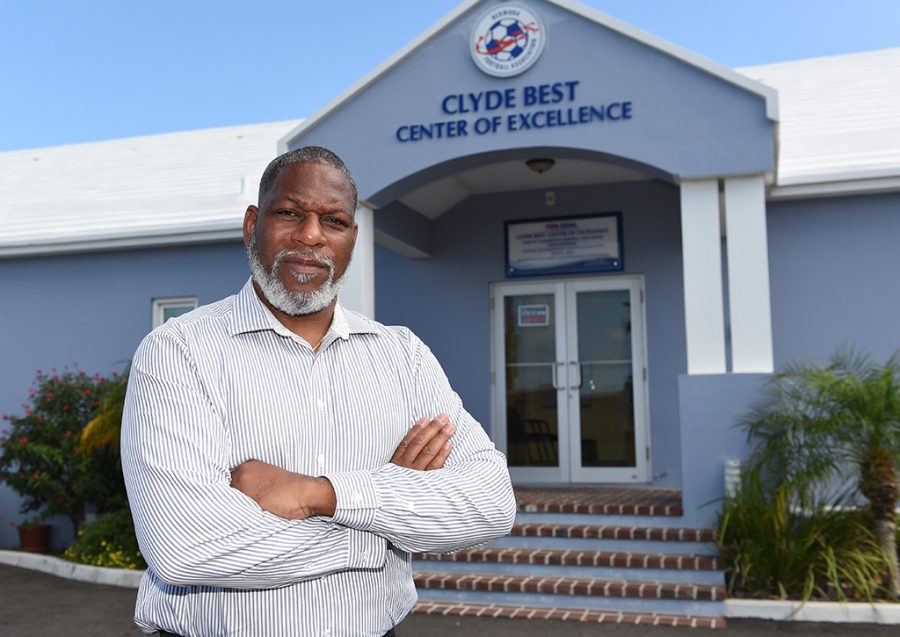by Duncan Hall
Photography by Akil Simmons
Mark Wade, president of the Bermuda Football Association, is in no doubt about the significant role that football plays in Bermudian culture. For men and women, for girls and boys, the sport is an integral part of the cultural milieu.
“It’s the first sport that most kids play – it was for me,” says the former player with Pembroke-Hamilton Club (PHC). “I played in kickarounds at school, and in the neighbourhood before I joined PHC at age 14.
“We even used to call part of my yard ‘Wembley’,” he says, referring to the iconic English stadium. “Football is the biggest sport in the world, and it is the biggest in Bermuda, too.”
The numbers support that view
The BFA’s most recent strategic planning exercise pulled together figures that demonstrate the vital role that football plays in Bermuda. For example:
- The BFA organises some 2,500 matches annually involving more than 3,000 registered players over a 32-week season that runs from September to April.
- Some 47 male senior teams and 95 male youth teams, are registered with the BFA for the current season, and there is an active – and growing – level of participation among girls ages 6-17. Most encouraging for the future of girls’ football was Bermuda’s Division Two championship at the Confederation of North, Central American and Caribbean Association Football (CONCACAF) under-15 girls’ tournament in August.
- Some 30 nationally registered referees participate in an average of three matches or training sessions weekly.
- More than 300 BFA and club administrators contribute approximately four hours per week to football. That translates to 1,200 hours per week, and 38,400 hours per season.
The BFA reckons that, together,
administrators, referees, players, coaches, and spectators, contribute nearly four million hours of football activity annually in Bermuda.
“Four million hours is actually on the low side,” Wade says. “That’s only for football under the BFA umbrella. That’s the bulk of it, but there are players in our sister leagues – the Corona League and Sunday Morning League that are independent of the BFA – and then there are the pick-up games, the kickarounds in neighbourhoods, kids playing at primary school and middle school. To say that football is an integral part of life in Bermuda is understating it.”
David Sabir, the BFA general secretary, heads up the organisation’s day-to-day operations.”This is how important football is generally,” Sabir says. “Football is almost embedded in our DNA. Before a baby is born, mothers would often say ‘I can feel my baby kicking!’ This is an exciting moment! Emotional moment! This is football! The expectations that we place on football, the core values of respect, fair play, teamwork, commitment, dedication, integrity, etc. is what we desire in life generally.
Football is a game of life!
For a select few, the sport has offered a career path – as the current season began, Bermudians were playing at professional clubs in England, Spain, Holland, Iceland, Sweden, Finland, Estonia and the United States.
Many more go away to US prep schools, and then perhaps on to university, on scholarship.
Twins Richard and Robert Calderon have been helping players to obtain scholarships to American high schools for some 20 years. In that time, Richard – a former president of the BFA – says that they have helped 48 student-athletes acquire scholarships with a total value in the millions of dollars.
“I would never suggest that someone should not pursue a professional footballing career,” Richard says, “but the more realistic and safer goal is to use football as a means to a college education. My brother and I are tangible evidence that it works as we both attended prep school in the US, and then the University of Alabama, on scholarships. Today, a significant percentage of players who are doing well in football in Bermuda have partially developed at the prep school and college level.”
Many of those players eventually return home and find that the US college game is excellent preparation for life on and off the field in Bermuda.
“The qualities that make someone a good footballer – teamwork, respect, fair play and co-operation – are also the qualities that employers look for in the workplace,” says Wade, who has spent his career in the telecommunications field.
Of course, there is also a commercial angle to football in Bermuda as any visitor to The Robin Hood, Docksider, Flanagan’s Outback, Astwood Arms, Bulldog’s Sports Bar, either of the two Swizzle Inns – or any number of other sports bars and pubs that screen football matches — can attest. Seats can be hard to come by during the quadrennial World Cup, annual mid-week Champions League matches or English Premiership matches.
“Football brings a significant amount of business to many of Bermuda’s pubs,” says Jay Correia, owner of the Swizzle Inns. “While the NFL, MLB, NHL and rugby have their supporters nothing equals the attraction of ‘footy’.
“In recent years, pubs have taken to becoming the home of certain teams like Chelsea at Swizzle Inn and Liverpool at Docksider. While many games can be watched at home the atmosphere of a pub crowd cheering their favourite team wins out for many people.”
Even Bermuda’s outgoing Chief Justice, Ian Kawaley, said his farewells at a special sitting of the Supreme Court in July of this year with a not-so-subtle mention of the side he supports, Manchester United, by saying that he “hopes the Bermuda Bar will in future be…United!”.
So, whether it’s on the field, in the classroom, in the bar – or in front of the Bar – it’s undeniable that Bermudians view football as an essential part of their lives.
Duncan Hall also finds football indispensable. He has attended four World Cups, two Euro tournaments, two Champions League finals, and once joined a group led by legendary Bermudian footballer Clyde Best that travelled to Buenos Aires to watch Argentina play Brazil.

